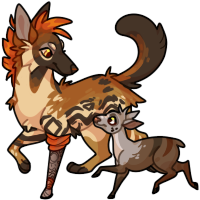Past:
A curl of leaf pokes through the fertile soil
And grasps fragilely for the golden light.
It's then she knows that hope and careful toil
Can fix the wrongs that no one thought to right.
A roar breaks through the cultivated doubt
She hums a tune to try to block it out --
"The Ash Grove" -- music helps a garden grow
That love and hate would cease to come to blows.
Present:
My mind sits like a crowned magnolia tree.
The wreath of blossoms brush their petals soft
Against my hand -- until from thorns a bead
Of vibrant read is called to arms to hold aloft
The solemn flag of pale surrender's cry,
And victory erupts to spew its horns
Over the soiled fields. Orchards burn and die,
And on the temple's placed a crown of thorns.
Future:
So, you. You saddened little cub, you're weak,
All shriveled up inside, no room at all
For second personalities - you seek
To have me gone. Pathetic. You see, doll,
I am a part of you as you are me.
We're thick as thieves, inseparable, and though
You may want me to leave, I, too, yoou see
Think you, a good-for-nothing brat, should go.
Now run your paws through precious garden thorns;
For you are dead, and I...
I am born.
-written by Naga on FR as commission-
 Kiamara's name:
Kiamara's name:She is named 'Hanako' by her parents respectively but there's more. This is due her unconditional love of nature and flowers which her parents could feel in her nature even before she had started talking or even moving.
However, she has a darker side to her. A different personality that seems to fight itself through once in a while, and it being so strange, so different from her caring self that her family and friends have dubbed this side of her 'Saku' which quite literally means 'split'.
 Personality:
Personality: Some people think it unfortunate to be alone. They might be correct for company that is welcome, but my situation is unique. I may never be without company, but I will always feel alone.
I wish I could have better explained to my parents how terribly they misunderstood me and my intentions, but they never gave me much of an opportunity. They ostracized me, leaving me withdrawn and quiet as a child, something that has followed me into adulthood. I want to say my past is darker, to give a small excuse for how reserved I am today, but I feel as though the distance my parents put themselves at was enough. Saku is to blame for that.
/
They don't understand how much better I could make you, Hanako, given a chance. Come on; let me in./
Ah, Saku. She's much like my shadow, a dark piece of me that I cannot dispose of, no matter how I try. Some people wish for company, while I wish mine gone-- ironic, isn't it, that steady company is the source of some of my loneliness?
/
Hah, she calls me the source of her loneliness. She can blame herself for that./
Saku believes herself a better version of me; braver, more unique, ambitious. I consider myself more a peace-seeker, and I'm happy with my companions. As an escape from my past, I began planting, using seeds and soil I'd been collecting since youth. I have a green thumb, if you will-- nature cares for me as much as I care for it. It has-- quite literally-- become a part of me, woven throughout my hair. We are so in tune that they change with me, brightest petals glowing with joy, but I am not the only emotion they reflect.
Saku has a place in me, too, and thus outside me. The twisted branches also respond to her, their gnarled arms extending on the rare occasion she overcomes me. I'd like to think I've done well to suppress her, at least most of the time… But there's only so much I can do with pure willpower. I don't know how much longer I can hold back something that is not only within me, but something that fights me for power, every waking moment. Sometimes sleeping, too.
I keep thinking that one day, I might be free of her. I can be myself, or at least at peace within my mind. Maybe then, those twisted branches would crumble and leave just blossoming flowers. I suppose all I can do for now, really, is hope.
/
Don't hold your breath./
 Saku's view:this is written from the point of view of Saku and it's about Hanako's life thus far
Saku's view:this is written from the point of view of Saku and it's about Hanako's life thus farThere’s a lot to be said for silence— the silence of growing, of thick soil woven together by roots. Nature is, in a moment, silent; it lends itself so well to oil paintings and charcoal sketches.
But, out of that moment, growing sounds like rushing water, and the soil sounds like a color tastes like a smell— all fresh. Only in snapshot increments are things ever silent, and most things are as continuous as the water-rock-element cycle nature propagates.
She is very silent— at any moment, she’s a dollop of paint drying on the canvas. Even in action, she comes close to silence, like a down feather falling. She’s the silence of tears dripping carefully into paws, the silence of sneaking out at night for a desperate gulp of air. “Out” is where she is not silent, where she’s allowed to make a sound, allowed to voice her protests. She protests the filth buried like seeds in the earth (the one thing she prays doesn’t grow), the sound of trees falling like bones breaking in a mother’s back, the eternal war waged between dirt and sand and civilization taking the side of the deserts. She protests, but no one hears, for at the start of the day, she returns home and is silent; she’s no heralding leader, champion of a cause.
So she starts with the small battles. In the shroud of night she harvests glass and brick from a patch of soil and sells them for seeds. The seeds she carefully cultivates, water and fertilizer like a babe’s swaddling cloths, coveting the small bits of life. It takes time and infinite patience, but soon she has a garden of leaves and flowers and herbs. Some are as soft as the fur on her belly, others tough as her nipping teeth. The blooms have flourished in as much variety and flamboyance as the spots on her body, and she feels a fullness from the top of her head to the tip of her tail. She goes home, and for the first time ever, is able to breathe that stifling, expectant air. At dawn she sleeps soundly, still feeling the satisfaction of creation deep in her bones.
That day is the worst of her life. Her parents, having somehow found out about her midnight escapades, forever ban her from leaving their home unless accompanied by a trusted adult. She refuses to tell them the location of her garden, and they sigh heavily at her, disappointed breaths weighing on her shoulders and chaining her to the ground. In a fit of hysteria, she runs and hides in the deepest corner of her room. Her parents don’t even try to give chase.
She wakes to an evening rife with magic, the specks of it piling on top of leaves and spilling down in a shower, watering the top of her head. She gives herself a shake, loosening a puff of magic from her coat, and hears rustling above her ears. An ivy leaf falls on a tendril and tickles her nose. Her laughter is a bit rusty, but she manages. She cannot go to her garden, so her garden has come to her. Life is in constant exchange— nature is no passive recipient.
She’s left home now, having long since saw it as poison as the waste poured into rivers, and to this day she still proudly bears the living boughs upon her head and tail. They are more radiant than any crown or jewel, for they shine from feeding out of her life’s breath, a pool clutched between her ribs. Nothing has changed about this garden— she still gives all her energy to it, all her smiles and softness. They grow steadily in turn, every new leaf like a testament of love, an assurance of home. Here is where you can always turn, the flowers whisper in her ear. A living cradle of never-aging saplings that she plants in her travels, each one a new tree, a new voice for Earth’s choir. She’s grown out of her silence now, has learned to speak where she might be heard. She’s learned to tell the important message for all those who wish to silence Earth— that their attempts to stifle and still Earth into a portrait or painting will fail, because many who walk this earth bear flowers in their hair, and as long as ones like her still walk, they will never stop singing this song of living things.



 ✧
✧  ✧
✧ 









